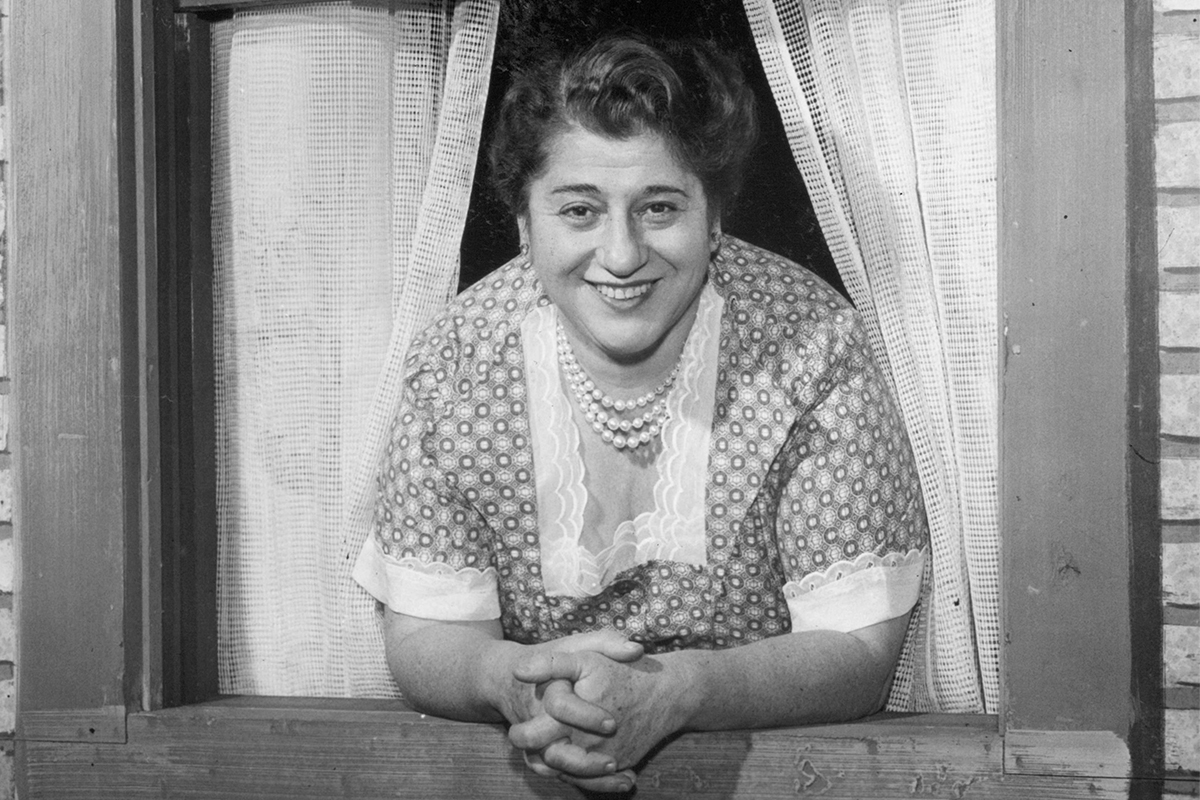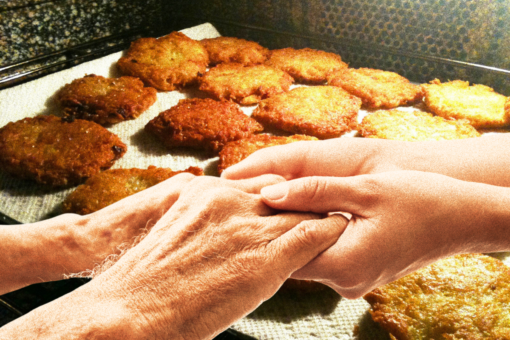I probably don’t need to tell you that the trope of the Jewish Mother is well-known. She can be crass, brazen, neurotic, stylish, savvy — she can be Midge Maisel or Fran Drescher or Molly Goldberg. She could be that chic Upper East Side Uppa-Baby stroller pusher, manicured and primed to fight the Friday morning grocery store rush. She could be your kindly neighbor, always baking, never without a handbag prepped with snacks, first-aid, three types of hand sanitizer, and the PTA phone list, just in case. She could be your best friend’s cousin’s mother-in-law, matchmaking with abandon, even though you’ve literally just met. She could be your mom!
Or your idea of one, if you don’t have the real thing.
There’s something both trite and funny about all of these women, often morphed into one two-dimensional persona, generated for laughs rather than realism. Stale as the caricature may be, when I was growing up without a present mom, I would have killed to have any one of these characters mother me.
I care much less now what other people think than I did in childhood, but with such an emphasis on motherhood in Jewish culture, I often felt the need to mention that my mother converted to Judaism so I would be considered “legitimate,” even though few of my friends ever met her. I knew I didn’t look like my blue-eyed, curly-haired relatives, and felt I needed to prove my belonging. My mother is Chinese, my dad is Ashkenazi, and I am an ambiguous albeit white-passing “you don’t look Jewish” 20-something.
To make a long and complicated story short, my mother was in and out of our lives when my little sister and I were young, and left for good by the time I turned 13. She was razor sharp, impatient, extroverted, and unpredictable with a mean streak. I now know that, during those early years, my mother was dealing with her own trauma, resentment, and illness, and projected much of it onto me. I do believe only hurt people hurt other people, so I try now to offer selichah — a type of forgiveness. It is, by definition, not reconciliation or an embrace; more so, it is reaching the conclusion that the person causing harm is also harming themselves. It is understanding that they, too, are human, and are deserving of understanding, and you are doing yourself and them a kindness by practicing selichah. Turns out there is Jewish guilt and Jewish forgiveness!
But growing up, I just wanted what everyone else seemed to have, regardless of the historical baggage. It seemed that every other little girl knew something, held some feminine secret I couldn’t grasp and would never know. I wanted a guide: someone to teach me how to French braid (YouTube helped me there), how to bake a cake (thank you, internet), how to get a boy to notice me (here’s to you, freshmen year of college). As a child, I didn’t like that I looked different, that I only had a dad around — I thought it was equivalent to not being pretty and being weird, neither of which are tragedies, but felt tragic to me. The fervor with which a preteen girl yearns to be beautiful and cool puts the passion of Hamlet to shame.
I was so sad and upset the first time I menstruated; there was only a vague idea in my mind of what to do, what products to use, what it all meant. It felt like I was given an involuntary bat mitzvah by some omnipotent rabbi in the sky, ruling over my hormones without my consent. It seemed like a punishment or a poorly timed joke; I couldn’t even figure out how to appear like a normal girl, so how could I grow up into a woman? I cried and hid my face behind my hair at school the next day. My dad, on the other hand, was A+ in that situation — he got me everything I could need, plus some chocolate. He wasn’t prepared to be a single dad, but he did his best. I still want to go back in time and give myself a hug and a hair tie.
Thankfully, I am no longer a child or a self-conscious preteen, and I have been lucky enough to gain much of what I lacked in younger years. I think that if you are lucky, you get to have more than one mother, and I have acquired many, all through various relationships and surprises. I call them my substitute mothers. It may come as a shock, but not one of them is a TV character. Some showed up fortuitously, some I sought out. They have guided me through everything I couldn’t figure out on my own.
One of these substitute moms is my dad’s ex-girlfriend. She is Catholic and — I mean this sincerely — a true saint. She is there for my sister and me whenever we need, however we need, and yes, we still get double the holiday presents from her.
Another substitute mom is a woman I worked for, entrusting me with the care of her two (amazing) daughters, having just moved from a town in France to New York City. Observing this woman mother her girls with such care and warmth and wit gave me a lot hope, and it still does. My voice teacher is in the club, too — she gave me jewelry and other beautiful things to wear when I was auditioning for conservatories because I didn’t own any myself. She wanted me to feel and look my very best at my school auditions, and I did. I got into every one.
There are more examples to recall — times when I needed guidance and someone stepped in — but that would just be bragging. Today, I love my hair and eyes and most other qualities that used to make me feel like an outsider. I’m relieved I don’t look like I popped out of a Norman Rockwell painting. My ancestors had to go through so much for me to even exist, so the least I can do is live well.
I can grieve what I missed and be very grateful for what I have. I am the unofficial president of the Motherless Daughters Club, and an ambassador for the Substitute Moms Club, and you are all welcome to join. These members will never fit any archetypes, and I probably won’t either. I will just have to be me, and I think that’s good enough.
Header image: Gertrude Berg in publicity portrait for the television series The Goldbergs, 1954, by Dumont Television/Getty Images



